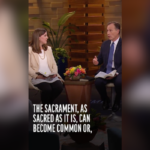
The California Sex Abuse Lawsuit and the LDS Church
Approximately one hundred people in California are alleging sexual abuse or misconduct linked to The Church of Jesus Christ of Latter-day Saints in California courts. If these claims all turn out to be true, that would represent one hundred individual tragedies—one hundred instances of innocence lost and one hundred relationships with God potentially complicated by the grievous actions (or inactions) of leaders. It would reflect one hundred stories of emotional and psychological pain.
Even if some of the cases do not hold up in court or are found to be inaccurate, it is heartbreaking to think that someone might feel so angry or disaffected as to make a false or exaggerated claim against the Church. Whether a claim is true or false, it indicates deep pain for those individuals and potentially serious consequences for the faith community they are accusing.
Responding with Care
As Latter-day Saints who have covenanted to mourn with those who mourn, we have an obligation to respond as best we can to these developments. Responding effectively to disclosures of sexual abuse requires empathy, active listening, and clear, survivor-centered steps. First and foremost, start by believing the survivor—thank them for trusting you and reaffirm that what happened was not their fault. As emphasized by RAINN and the National Sexual Violence Resource Center, a supportive response prevents secondary victimization, where a survivor is retraumatized by disbelief or judgment.
There is a role for recognizing that false accusations exist. But that role is in broader policy conversations and in specific accusations where the legal system is equipped to provide the accused with the presumption of innocence.
Next, listen without pressing for details the survivor is not ready to share. Calmly acknowledge their pain: “I’m so sorry this happened to you. You’re not alone, and I’m here to help.” Validate their feelings of anger, sorrow, or confusion. According to the Washington Coalition of Sexual Assault Programs, avoiding “why” questions and blame is crucial for building trust.
Survivors need practical resources and emotional support. Empower their choices—offer options such as counseling, medical care, or contacting the police, but let them decide. For faith communities, consider how spiritual care can integrate with professional help. The FaithTrust Institute notes that survivors may grapple with spiritual doubts if the abuse occurred in a religious context. Faith leaders can provide prayer, scripture study, or pastoral conversations if the survivor desires it. We can privately implore that the atonement’s healing power will reach them if they do not desire in-person interactions of this kind.
Above all, do not underestimate the healing power of compassion and genuine support. A caring, nonjudgmental environment helps survivors feel safe enough to begin rebuilding their lives. As followers of Jesus Christ this may be our best way to help as the Savior’s hands in moving healing forward. By following these best practices—believing, validating, providing options, and ensuring accountability—you can be a steady source of hope and healing for those who have experienced sexual abuse.
To read the entire article: Public Square Magazine









